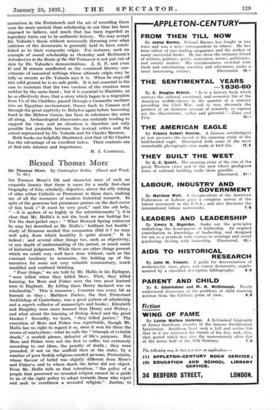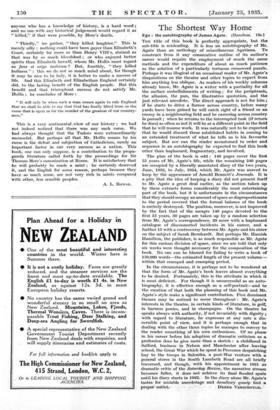Blessed Thomas More SIR THOMAS Moat's life and character were
'of such an exquisite beauty that there is room for a really first-class biography of him, scholarly, objective, above the silly taking of sides either Catholic or Protestant in these days, making use of all the resources of modern historical research. In spite of the generous but premature praises on the dust-cover of this book (" It must be very good," said the old lady, " —it is spoken of so highly in the advertisements "), it is clear that Mr. Hollis's is not the book we are looking for. Yet the dust-jacket says : " What Howard Spring (whoever Ire may be) described as Mr. Hollis's brilliant but hostile' study of. Erasmus needed this companion (Did it ? we may well ask), from which hostility is quite absent." It is indeed ; and several other things too, such as objectivity, or any depth of understanding of the period, or much sense of historical judgement. While-there are other things present which we could very well have done without, such as the constant tendency to sermonize, the holding up of the narrative for some not very valuable commentary, much muddled and confused thinking.
" Four things," we are told by Mr. Hollis in his Epilogue, " were killed when they killed More. First, they killed learning, for More and Fisher were the two most learned men. in England. By killing them Henry declared war on scholarship." This is nonsense ; Cranmer was every bit as learned as they.; Matthew Parker, the first Protestant Archbishop of Canterbury, was a great patron of scholarship and a superb collector of manuscripts and books ; Elizabeth and Burghley- were more learned than Henry and Wolsey ; and what About the learning of Bishop Jewel and the great Hooker ? Secondly, we learn, " they killed justice." The execution of More and Fisher was regrettable, though Mr. Hollis has no right to regard it so, since it won for them the crown of martyrdom—what he calls the " triumph of evitable death," a morbid phrase, defeatist of life's purposes. But More and Fisher were not the first to suffer, too extremely according to our ideas, the penalty of death ; they were preceded, if not on the scaffold then at the stake, by a number of poor foolish religious-minded persons, Protestants, whose flavour of belief was slightly different from More's and Fisher's, and to whose death the latter did not object. Even Mr. Hollis tells us that toleration, " the policy of a people that possessed no revealed religion cannot be a guide to us of the right policy to adopt towards those who reject and seek to overthrow a revealed religion." Justice, to
anyone who has a knowledge of history, is a hard word ; and no one with any historical judgement would regard it as killed," if that were possible, by More's death.
, " Thirdly," we gather, " they 'killed laughter." This is merely silly : nothing could have been gayer than Elizabeth's Court, certainly far more so than Henry VIII's, stained as that was by so much bloodshed ; or who enjoyed better spirits than Elizabeth herself, whom Mr. Hollis must regard as foes et origo malorum? But, fourthly, " they killed holiness " : this we do not so much mind about, for though it may be nice to be holy, it is better to make a success of life. And this Elizabeth and Elizabethan England certainly did, to the lasting benefit of the English people. • But this benefit and that triumphant success do not satisfy Mr. Hollis ; he concludes of More :
" It will only be when such a man comes again to rule England that we shall be able to say that God has finally lifted from us the curse that is upon us for the murder of the greatest of our country- men."
This is a very sentimental viewof our history ; we had not indeed noticed that there was any such curse. We had always thought that the Tudors were extraordinarily successful. But perhaps all that Mr. Hollis means by his curse is the defeat and subjection of Catholicism, surely an important factor in our very success as a nation. This book, one can only suppose, is a contribution to the propa- ganda literature called forth by the proceedings for Sir Thomas More's canonization at Rome. It is satisfactory that he will probably be made a saint ; he certainly deserved it, and the English for some reason, perhaps because they have •so much sense, are not very rich in saints compared with other, less sensible peoples.
A. L. ROWSE.















































 Previous page
Previous page